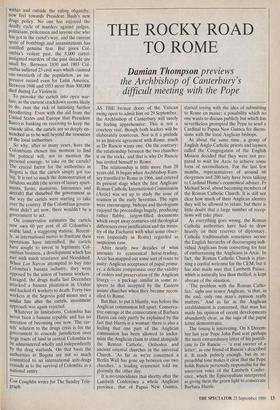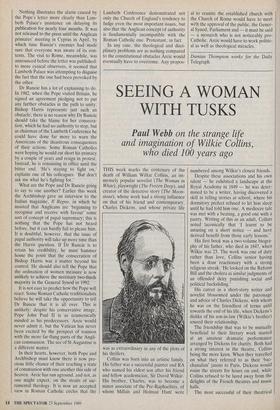THE ROCKY ROAD TO ROME
Damian Thompson previews
the Archbishop of Canterbury's difficult meeting with the Pope
AS THE bronze doors of the Vatican swing open to admit him on 29 September, the Archbishop of Canterbury will surely be feeling apprehensive. This is not a courtesy visit, though both leaders will be elaborately courteous. Nor is it a prelude to an historic agreement with Rome, much as Dr Runcie wants one. On the contrary: the relationship between the two churches is on the rocks, and that is why Dr Runcie has invited himself to Rome.
The relationship is little more than 20 years old. It began when Archbishop Ram- sey travelled to Rome in 1966, and entered its present stage when the first Anglican/ Roman Catholic International Commission (Arcic) was set up to study the issue of reunion in the early Seventies. The signs were encouraging: bishops and theologians enjoyed the proceedings hugely, producing rather flabby, jargon-filled documents which swept away centuries-old theological differences over justification and the minis- try of the Eucharist with what some obser- vers (especially in Rome) regarded as suspicious ease.
After nearly two decades of what amounts to ecumenical horse-trading, Arcic has mapped out some sort of route to unity: Anglican acceptance of papal prima- cy, a delicate compromise over the validity of orders and preservation of the Anglican liturgy — a package similar in some re- spects to that accepted by the Eastern uniate churches when they became recon- ciled to Rome.
But that, to put it bluntly, was before the Anglican communion fell apart. Conserva- tive outrage at the consecration of Barbara Harris can only partly be explained by the fact that Harris is a woman: there is also a feeling that one part of the Anglican communion has been allowed to under- mine the Anglican claim to stand alongside the Roman Catholic, Orthodox and ancient oriental churches in the universal Church. 'As far as we're concerned a Berlin Wall has gone up between our two churches,' a leading ecumenist told me gloomily the other day.
It is no coincidence that shortly after the Lambeth Conference a whole Anglican province, that of Papua New Guinea, started toying with the idea of submitting to Rome en masse: a possibility which no one wants to discuss publicly but which has nevertheless prompted the Pope to send a Cardinal to Papua New Guinea for discus- sions with the local Anglican bishops.
At about the same time, a group of English Anglo-Catholic priests and laymen called the Congregation of the English Mission decided that they were not pre- pared to wait for Arcic to achieve some form of reconciliation. For the last few months, representatives of around 60 clergymen and 200 laity have been talking to Cardinal Hume's ecumenical adviser, Fr Michael Seed, about becoming members of the Roman Catholic Church. It is still not clear how much of their Anglican identity they will be allowed to retain, but there is little doubt that a large number of recep- tions will take place.
As everything goes wrong, the Roman Catholic authorities have had to draw heavily on their reserves of diplomacy. Catholic traditionalists sometimes accuse the English hierarchy of discouraging indi- vidual Anglicans from converting for fear of embarrassing the Anglicans in Arcic. In fact, the Roman Catholic Church is plan- ning a cordial welcome for the CEM; but it has also made sure that Lambeth Palace, which is naturally less than thrilled, is kept abreast of the situation.
'The problem with the Roman Catho- lics,' sighs one senior Anglican, 'is that, in the end, only one man's opinion really matters.' And as far as the Anglican establishment is concerned, that man has made his opinion of recent developments abundantly clear, as the saga of the papal letter demonstrates.
The timing is interesting. On 8 Decem- ber last year Pope John Paul sent perhaps the most extraordinary letter of his pontifi- cate to Dr Runcie — 'a real snorter of a letter', as one friend of Runcie's described it. It reads politely enough, but its re- proachful tone makes it clear that the Pope holds Runcie personally responsible for the uncertain voice of the Lambeth Confer- ence, which the Episcopalians interpreted as giving them the green light to consecrate Barbara Harris. Nothing illustrates the alarm caused by the Pope's letter more clearly than Lam- beth Palace's insistence on delaying its publication for nearly four months. It was not released to the press until the Anglican primates' meeting in Cyprus in April, by which time Runcie's enemies had made sure that everyone was aware of its con- tents. The visit to Rome, meanwhile, was announced before the letter was published: to more cynical observers, it seemed that Lambeth Palace was attempting to disguise the fact that the one had been provoked by the other.
Dr Runcie has a lot of explaining to do. In 1982, when the Pope visited Britain, he signed an agreement pledging not to put any further obstacles in the path to unity. Bishop Harris represents just such an obstacle; there is no reason why Dr Runcie should take the blame for her consecra- tion, which he had no authority to stop, but as chairman of the Lambeth Conference he could have done far more to warn the Americans of the disastrous consequences of their actions. Some Roman Catholics were hoping he would cut short his primacy by a couple of years and resign in protest. Instead, he is remaining in office until the bitter end. 'He's staying to fight on,' explains one of his colleagues. 'But don't ask me what he's fighting for.'
What are the Pope and Dr Runcie going to say to one another? Earlier this week the Archbishop gave an interview to the Italian magazine, 11 Regno, in which he insisted that Anglicans are 'beginning to recognise and receive with favour' some sort of concept of papal supremacy; this is nothing that the Pope has not heard before, but it can hardly fail to please him. It is doubtful, however, that the issue of papal authority will take up more time than the Harris question. If Dr Runcie is to retain his credibility, he must hammer home the point that the consecration of Bishop Harris was a matter beyond his control. He should also tell the Pope that the ordination of women measure is now unlikely to achieve the necessary two-thirds majority in the General Synod in 1992.
It is not easy to predict how the Pope will react. Some Roman Catholic traditionalists believe he will take the opportunity to tell Dr Runcie that it is all over. This is unlikely: despite his conservative image, Pope John Paul II is as ecumenically minded as his predecessors. Arcic would never admit it, but the Vatican has never been excited by the prospect of reunion with the more far-flung parts of the Angli- can communion. The see of St Augustine is a different matter.
In their hearts, however, both Pope and Archbishop must know there is now pre- cious little chance of their reaching a state of communion with one another this side of heaven. Arcic has run aground, and not, as one might expect, on the straits of sac- ramental theology. It is now an accepted view in Roman Catholic circles that the Lambeth Conference demonstrated not only the Church of England's tendency to fudge even the most important issues, but also that the Anglican concept of authority is fundamentally incompatible with the Roman Catholic one. Protestant, in fact.
In any case, the theological and disci- plinary problems are as nothing compared to the constitutional obstacles Arcic would eventually have to overcome. Any propos- al to reunite the established church with the Church of Rome would have to meet with the approval of the public, the Gener- al Synod, Parliament and — it must be said — a monarch who is not noticeably pro- Catholic. Arcic would have to work politic- al as well as theological miracles.
Damian Thompson works for the Daily Telegraph.



























































 Previous page
Previous page